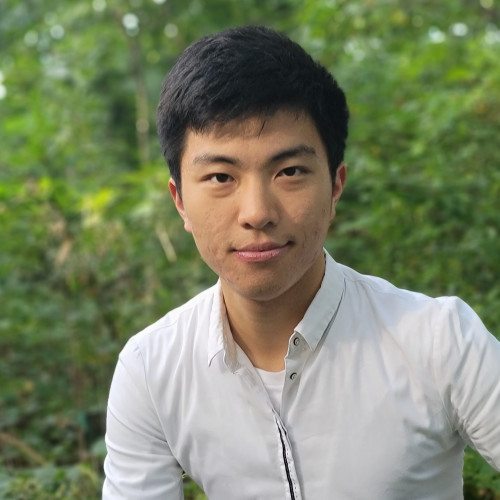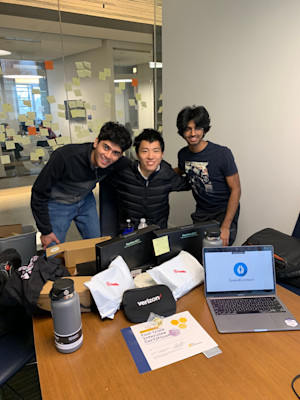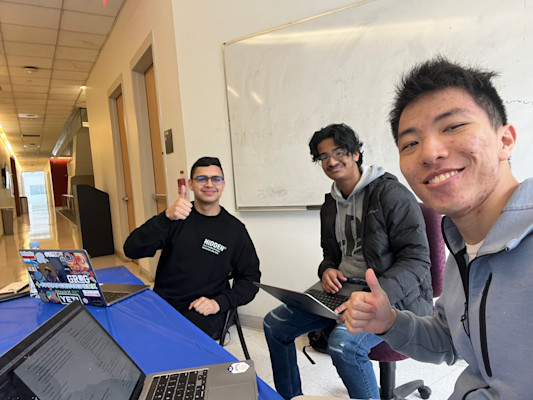Chinat Yu, 23

Originally from Hong Kong, Chinat Yu just graduated from Johns Hopkins University in Baltimore. When he moved to the United States, he knew of four career options: doctor, banker, lawyer, and failure. None of them interested him. He moved aimlessly from class to class, unsure of the right major, until the fateful day he discovered hackathons.
His first hackathon was intimidating at first. He had no computer science experience and only attended based on the promise of giveaways and free food. However, the buzzing environment of HopHacks 2019 awakened a sudden excitement within him. He says, “The hackathon I attended was a turning point in my life. I was amazed by the creativity, problem-solving, and collaborative environment that was so unique to the hacker community.” Hackathons ignited his passion for programming. “Now I know that there are more options than what I was initially told,” he said. “Software engineering is the path that I would like to pursue.”
During the pandemic, Chinat leveraged his newfound spare time by pivoting to pursue a computer science degree. He says, "Computer Science was the only major where classes were the same both offline and online, behind a screen. I had the space to figure out what I wanted to do in college and catch up with my peers." Throughout this career change, he worked with mentors who changed his life, opening his eyes to the importance of mentorship and community support. For example, Aaron Osher, his mentor at the YCP Hackathon, introduced Chinat to the T3 Stack and changed his outlook on what technology is truly capable of achieving.
It is this spirit of mentorship that Chinat appreciates the most about Major League Hacking, and more broadly, the hackathon community. Many coders have their specific strengths, but having an entire network of accomplished individuals who are ready and willing to help others is what sets the hacker community apart.
Chinat’s future had been predetermined and limited when he arrived at college, but computer science knocked down those walls. Coaching and mentoring were a natural progression and a way to return the favor. Chinat is the founding Vice President of the Johns Hopkins Software Engineering Club, where he organizes meetups and workshops for fellow hackers. He has served as a mentor to many, and was even invited to speak about hackathons to over 100 students at his university. He continues to share knowledge and experience through his podcast, Hopkins Hacks, and on his personal website. He built his website, which allows students to learn more about him by chatting with his AI digital twin, over the course of a hackathon. Chinat continues to attend monthly hackathons to hone his skills and stay involved with the community. He said, “I have attended and won 4 hackathons this year alone, and I would love to keep that streak up.”
Chinat knows that illuminating new and unfamiliar ideas for others can be life-changing, as it was for him. He says, “It brings me great joy to see others get excited about technology and coding, and I’m proud to be a part of the movement that’s driving innovation and change in the world.” The best news is that the community at large gets to take part in that joy and gain inspiration from the great things Chinat is accomplishing. Having discovered the power of mentorship, community, and technology through hackathons, Chinat will combine these passions through the Masters in Learning, Design and Technology program at Stanford in Fall 2023. He says, “I envision a future where learning is engaging, accessible, and personalized, leveraging the power of technology and community to transform education into a personal journey that enriches every student's life and amplifies their potential.”
Quick Facts


Chinat Yu, 23

Originally from Hong Kong, Chinat Yu just graduated from Johns Hopkins University in Baltimore. When he moved to the United States, he knew of four career options: doctor, banker, lawyer, and failure. None of them interested him. He moved aimlessly from class to class, unsure of the right major, until the fateful day he discovered hackathons.
His first hackathon was intimidating at first. He had no computer science experience and only attended based on the promise of giveaways and free food. However, the buzzing environment of HopHacks 2019 awakened a sudden excitement within him. He says, “The hackathon I attended was a turning point in my life. I was amazed by the creativity, problem-solving, and collaborative environment that was so unique to the hacker community.” Hackathons ignited his passion for programming. “Now I know that there are more options than what I was initially told,” he said. “Software engineering is the path that I would like to pursue.”
During the pandemic, Chinat leveraged his newfound spare time by pivoting to pursue a computer science degree. He says, "Computer Science was the only major where classes were the same both offline and online, behind a screen. I had the space to figure out what I wanted to do in college and catch up with my peers." Throughout this career change, he worked with mentors who changed his life, opening his eyes to the importance of mentorship and community support. For example, Aaron Osher, his mentor at the YCP Hackathon, introduced Chinat to the T3 Stack and changed his outlook on what technology is truly capable of achieving.
It is this spirit of mentorship that Chinat appreciates the most about Major League Hacking, and more broadly, the hackathon community. Many coders have their specific strengths, but having an entire network of accomplished individuals who are ready and willing to help others is what sets the hacker community apart.
Chinat’s future had been predetermined and limited when he arrived at college, but computer science knocked down those walls. Coaching and mentoring were a natural progression and a way to return the favor. Chinat is the founding Vice President of the Johns Hopkins Software Engineering Club, where he organizes meetups and workshops for fellow hackers. He has served as a mentor to many, and was even invited to speak about hackathons to over 100 students at his university. He continues to share knowledge and experience through his podcast, Hopkins Hacks, and on his personal website. He built his website, which allows students to learn more about him by chatting with his AI digital twin, over the course of a hackathon. Chinat continues to attend monthly hackathons to hone his skills and stay involved with the community. He said, “I have attended and won 4 hackathons this year alone, and I would love to keep that streak up.”
Chinat knows that illuminating new and unfamiliar ideas for others can be life-changing, as it was for him. He says, “It brings me great joy to see others get excited about technology and coding, and I’m proud to be a part of the movement that’s driving innovation and change in the world.” The best news is that the community at large gets to take part in that joy and gain inspiration from the great things Chinat is accomplishing. Having discovered the power of mentorship, community, and technology through hackathons, Chinat will combine these passions through the Masters in Learning, Design and Technology program at Stanford in Fall 2023. He says, “I envision a future where learning is engaging, accessible, and personalized, leveraging the power of technology and community to transform education into a personal journey that enriches every student's life and amplifies their potential.”
Quick Facts





